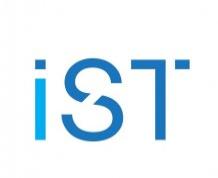Making the exceptional happen!
It’s good to see some of our Technical Services staff in our new corporate strategy video. Technicians do a fantastic job of delivering an exceptional (Top 10, Global 100) service to our research and research-inspired learning, through academic partnerships and collaboration, provision of a sustainable and flexible team, and by promoting compliance and best practice. They really are the linchpins that enable new and exciting discoveries to be made.
To read more about our new University Strategy, and how we can make the exceptional happen, please visit the dedicated website on our University webpages.
Technical Services Conference 2017
It’s coming – Registration is now open! All University of Exeter technicians should have now received a personal invitation to the conference through their email. If you have not received your invitation yet, please email j.cresswell@exeter.ac.uk to request your invitatio.
The webpages for the Technical Services Conference 2017 are now live! Keep up to date with how the conference is shaping up by visiting the website regularly.
Event: Technical Services Conference 2017
Date: 6 Jul 17
Time: 10:00-17:00
Venue: St Luke’s Campus, Exeter
Delegates: All 192 technical staff at the University of Exeter are invited. We are also inviting delegates from other HEIs and representatives from the Science Council, the Institute of Science and Technology and HEaTED.
Prof. Sir Steve Smith, our Vice Chancellor, has confirmed that he will be a keynote speaker at our Technical Services conference. This demonstrates top level commitment to our technical staff, and sends a really positive message.
Keynote speakers and workshops at the conference will be tailored specifically for our scientific and engineering technical staff who support research and research-inspired learning. The focus for our conference will be networking; personal and professional development; leadership and management; and Health, Safety and the environment.
Help shape your conference! If you have ideas on awards, sessions and workshops, or are interested in helping out with this years event, please click here.
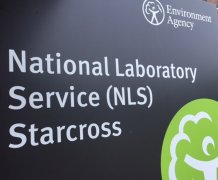 Working together with the Environment Agency National Laboratory Service (NLS)
Working together with the Environment Agency National Laboratory Service (NLS)
It was great to have the opportunity to look around the Environment Agency National Laboratory Service (NLS) labs at Starcross and discuss Professional Development opportunities with James Trout and Jackie Tucker on 1 Nov 16. We are looking at working together to raise the profile of technical/scientific staff, engaging with the South Devon UTC, The Science Council, and the Institute of Science and Technology.
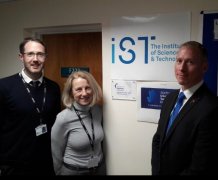 We also met with Alison Hannah from South Devon UTC to plan our Institute of Science and Technology day (in December 2016) promoting technical careers, apprenticeships and professionalism. Doing our bit for the next generation of scientists.
We also met with Alison Hannah from South Devon UTC to plan our Institute of Science and Technology day (in December 2016) promoting technical careers, apprenticeships and professionalism. Doing our bit for the next generation of scientists.
We will be looking to arrange laboratory tours in the forthcoming months both at the NLS labs and hosting some of the EA team here at the University of Exeter.
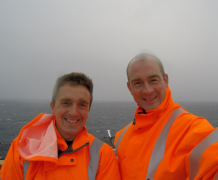 Modal test of Bishop Rock Lighthouse
Modal test of Bishop Rock Lighthouse
STORMLAMP researchers from Exeter and Plymouth concluded a sequence of measurements on an offshore rock lighthouse in the South West with a modal test of Bishop Rock lighthouse.
Bishop Rock is a massive structure, built on a rocks four miles south west of the Scilly Isles, that sheer from 45m deep in the Atlantic Ocean. The first structure, completed in 1858, was strengthened in 1881 by building a new structure around the existing lighthouse and extending the height by 12m to 44m above mean high water.
To read more of this article click here.
EMPS Reflectance Transformation Imaging field tested in collaboration with Balkan Heritage Foundation
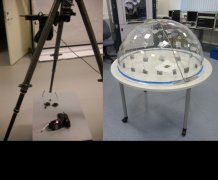 The Imaging Suite, Harrison Building acquired a new imaging technique called Reflectance Transformation Imaging (RTI) in August 2016. Dr Jacqueline Christmas from Computer Science and Dr Judith Bannerman from the Imaging Suite, were invited to meet Prof. George Bevan from Queen’s University, Ontario, Canada, field test the RTI equipment in Bulgaria on an archaeological site and discuss research collaboration and advancements in the field of RTI.
The Imaging Suite, Harrison Building acquired a new imaging technique called Reflectance Transformation Imaging (RTI) in August 2016. Dr Jacqueline Christmas from Computer Science and Dr Judith Bannerman from the Imaging Suite, were invited to meet Prof. George Bevan from Queen’s University, Ontario, Canada, field test the RTI equipment in Bulgaria on an archaeological site and discuss research collaboration and advancements in the field of RTI.
Prof. Bevan is an expert in the use of computational photographic techniques that employ both RTI and digital photogrammetry, with a particular interest in enhancing inscriptions on weathered surfaces. He is keen to collaborate with us on the development of an integrated system that provides accurate surface metrology but also to expand the technique into other areas such as micro-RTI using only commercially available digital cameras and inexpensive, off the shelf equipment. The aim of the visit to Bulgaria was to initiate a collaboration with Prof. Bevan, to develop the mathematical and computational science behind photogrammetry RTI and to gain insight into the latest developments in the field.
What is Reflectance Transformation Imaging?
RTI is a computational photographic method that captures a subject’s surface shape and colour, and enables the interactive re-lighting of the subject from any direction. It is a technique that uses a digital camera in order to take a series of photographs of an object each with a different light position. A free software package originally developed by Hewlett-Packard Labs, is then used to combine the information from the 40-120 images to produce a single three dimensional rendering of the surface.
RTI also permits the mathematical enhancement of the subject’s surface shape and colour attributes. The enhancement functions of RTI reveal surface information that is not disclosed under direct empirical examination of the physical object.
Aurora
Technical Services are proud to support Judith Bannerman on the Leadership Academy Aurora programme this year.
Aurora is the Leadership Foundation’s (LFHE) women-only leadership development that combines workshops including cross-institutional action learning sets, in-house mentoring and on-line resources. It aims to enable women in academic and professional staff roles to think of themselves as future leaders; to influence their institutions and to develop leadership skills. Aurora provides a positive experience of leadership and encourages participants to recognise their talent and capabilities and ‘step-up’ to promoted posts.
To read more about Aurora visit our webpages.
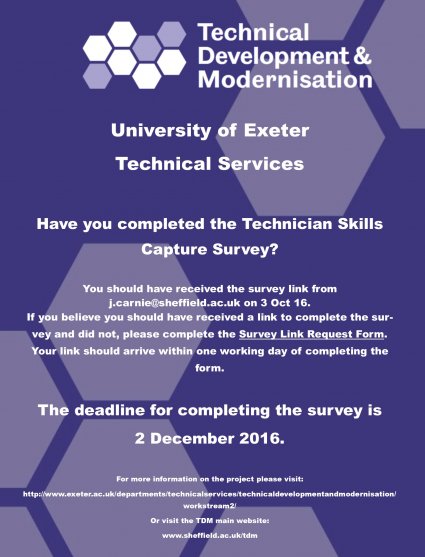 HEFCE Technician Skills Capture Survey
HEFCE Technician Skills Capture Survey
We launched our HEFCE Technician Skills Capture Survey on 3 Oct 16. The survey is being piloted at various universities across the UK, including the University of Exeter, in order to capture the views of technical staff and ensure the toolkit is as beneficial to the technical community as possible. It should take between 30-60 minutes to complete (depending upon your skill set), and can be completed in more than one session.
The survey aims to capture information related to the skills, roles and responsibilities that technical services technicians at the University possess. This survey will be part of a toolkit to be used by higher education institutions across the UK in addressing career progression within the technical community. This survey all is about your personal skills and not just skills you are currently using (i.e. if you have skills you are not using in your current role then you should still include these in your responses). The information will be used for both your personal development (if you chose to use it this way) and for Technical Services development and is not part of any restructuring process. See the benefits of taking part section on our survey webpage for more details.
IST Newsletter Autumn 2016
Please follow this link to the latest IST newsletter.
TechNet – Are you registered for the Technicians Network forum yet?
Have you joined in the discussions on the Technicians Network (TechNet) yet? Membership is FREE and all you need to do to register is click here and complete your details.
The forum has a number of threads that may be of interest to you and your team, and will enable you to network with other like minded Technical staff in other Higher Education Institutions.
Along with the general conversations, and members only section, the University of Exeter has a sub-group you can write posts to.
TechNet is part of the HEFCE Technical Development and Modernisation project being run by the University of Sheffield. So, sign up today and be part of the conversation.
For the latest TechNet newsletter click here. topics discussed are:
- TechNet Events
- IST Technical Conference 2016
- HEaTED Networking Events
- CPD -The Creative Approach
- Calling all technicians
- Technicians – get recognition for your teaching and teaching support
- S Labs Conference
- Recognition Corner
- Technically Speaking: a newsletter for technicians, by technicians
- Technically Speaking: Grow your own . . . rocket science!
- TechNet: Your National Network Launch of UEA Technicians Network
 HEaTED
HEaTED
Building a technicians’ network is the leading article of the Autumn issue of the HEaTED magazine. Other articles outline the benefits of professional registration, describe the highlights of the ‘Technicians make it happen’ campaign and include an interview with the Aerospace Technical Project Manager in the Faculty of Engineering at the University of Nottingham. Also included is a list of high quality CPD courses for technicians.
Read HEaTED Magazine (October 2016) here
Professional Registration Case Study – Chartered Scientist (CSci)
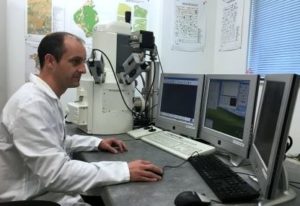 The award of professional registration is a significant milestone for any technician. It signifies that you have verified knowledge, understanding and competence in your scientific area.
The award of professional registration is a significant milestone for any technician. It signifies that you have verified knowledge, understanding and competence in your scientific area.
Professional registration shows you are committed to continually update your skills and knowledge, keeping up to date with the latest technology and techniques.
Read what Gavyn Rollinson CSci has to say about professional registration here.
Technical Services: Mentoring feedback from a mentor and mentee
Read our mentoring webpages to find out what it involves, how much time it takes, and why you should help.
Professional Registration with the Institute of Mechanical Engineering
 Recently I have been promoting the Science Council and the IST as the professional registration bodies for Technical Services. However, I believe that it may be more appropriate for you to become members, and subsequently professionally registered with, the Institute of Mechanical Engineering.
Recently I have been promoting the Science Council and the IST as the professional registration bodies for Technical Services. However, I believe that it may be more appropriate for you to become members, and subsequently professionally registered with, the Institute of Mechanical Engineering.
I have tried to sum up the application process and make applying for membership as easy as I possibly can.
Professional registration gives you:
- The chance to benchmark your skills against a global standard.
- Recognition of your experience and better career prospects.
- Transferability of your skills to other roles or organisations.
- Improved job satisfaction and ongoing development.
- Other membership benefits.
The application process
Note: all apprentices should skip steps 1 and 2 and go straight to Sep 3, and apply for a FREE affiliate membership.
1. Use the route to membership tool to find out which professional registration level is right for you.
2. Check your academic qualifications. Academic requirements are listed here.
3. Complete the relevant application form (the blue “apply online” button is near the bottom of each page):
- CEng
- IEng
- EngTech
- Affiliate. Apprentices can apply for affiliate membership FREE – I would like to encourage all our apprentices apply. (Click on the blue “apply for apprentice membership” button near the bottom of the page).
4. In addition, for CEng and IEng you will need to:
- Get support from 2 sponsors.
- Submit your application by applying online Links at the bottom of the following guidance pages.
- Professional review interview. The interviewers will focus on your most recent and relevant experience. They will make their judgements based solely on the information provided on your application and your performance during the interview. The interview will take approximately 45 minutes.
5. Note: Technical Services will pay the following towards your registration entry fee:
- CEng. £47.80
- IEng. £40.40
- EngTech. £16.50
You only need to pay this fee when your application is successful. Membership team Tel: +442073046999, email: membership@imeche.org.
Good luck in your applications.
Professional Development
Congratulations to Jonathan Cresswell on becoming our latest member of the IST (MIScT). Our Technical Services roll of honour shows all our technical staff who have professional memberships and are professionally registered.
Read about Jonathan’s experience of the membership application process on TechNet.
Apprenticeship Graduation
Congratulations to George Ricketts who graduated from Exeter College on 21 October 2016. Read more on our dedicated apprenticeship webpages.
Technicians make it happen!
The Science Council is supporting the Technicians Make it Happen (TMiH) campaign by the Gatsby Charitable Foundation, that challenges outdated notions of what technicians do and aims to inspire a generation of people to consider pursuing technical roles.
You can show your support for the campaign in a couple of ways.
- Take pictures for the photo competition
- Help raise the profile of technicians by taking pictures of what you think technicians help to make happen. These can be everyday objects or out of this world innovations – just include “Technicians Make it Happen” somewhere in the image.
- Read more about the competition details and watch this video for a flavour of the type of thing that is expected.
Logo for your photos here.
Share your pictures
Share your images across social media tagged with #TechniciansMakeitHappen. The online competition will run across Instagram, Twitter and Facebook – in which a winner will be picked every month to receive a £25 Amazon voucher. The competition will be ongoing throughout the 2016/17 academic year and an overall winner will be announced next year, who will receive a grand prize of £1000 and career mentorship from an industry expert.
Health and Safety Notices
Health Surveillance
Before an individual is referred to Occupational Health for health surveillance a manager should make an assessment of the roles of those in their team to identify any health surveillance needs. The Health Surveillance standard which can be found on the Health and Safety website under Safety Standards, is an essential source of information. It outlines the elements required for an individual to be referred into the health surveillance programme, including identification of persons/tasks requiring Health Surveillance and referral to the Occupational Health Service for Health Surveillance assessment.
Further information and advice about assessment for health surveillance is available from the Health Surveillance Needs Assessment Form. This outlines each health risk and gives guidance on how to assess for risk, and information on what health surveillance may be required. Workers exposed to any of the following will need to complete the Health Surveillance Needs Assessment Form:
- Noise (average exposure above 85dB)
- Lead (Smelting or heating)
- Vibration (Hand arm Vibration, or whole body vibration)
- Asbestos (removal/disturbance)
- CoSHH (High risk processes, respiratory sensitisers, substances with serious long term effects, carcinogens, mutagens, mercury)
- Ionising Radiation (over exposed workers, designated persons)
- Non ionising radiation/Lasers (overexposed, class 3R, 3B and 4 lasers, high power magnetic fields, UV)
- Also consider: Diagnosed allergy to Latex, workers outside in sunshine, dermatitis)
Occupational Health and the Safety Team can also be contacted for advice and information if required.
Accident and Near Miss Reporting
All incidents will be reported by staff and/or students as soon as possible after the event, using the University Incident Reporting Form. The Safety team will treat all incidents reported in confidence. Names of persons involved will only be used in the event of a HSE report or escalation to the manager / Insurance Office.
Immediate action will be taken by the person(s) present at the incident at the time (where possible) to ensure that any remaining hazards are made as safe as possible as soon as possible.
- Dial 999 for emergency services.
- You may need to contact a First Aider. The first aider list is available on the University intranet site or alternatively you can call Estate Patrol (Exeter) on ext. 2222 (01392 722222) or Campus Patrol (Penryn) on ext. 4444 or ext. 3666 (01326 253666).
- Contact Estates Patrol/ Campus Security if required to help with campus based incidents. Contact your local Security for non-campus locations.
- Campus Services Helpdesk (ext 4552) should be contacted if the incident is building / services / grounds related as well as Line Managers or alternatively Estates Patrol (ext 4999).
- Complete University Incident Reporting Form.
Managing Wellbeing and Building Resilience
Managing Wellbeing & Building Resilience training. This is a full day session for line-managers and others whose role includes responsibility for employee welfare. The morning session will cover organisational responsibilities for creating and maintaining a positive work environment. It follows the Wellbeing Standard framework; proactive management of employee wellbeing, supporting individuals who are showing signs of stress, and managing absence and the return to work. Participants will get the opportunity to explore their own leadership style and consider management behaviours that are effective in the prevention and reduction of work-related stress.
The afternoon session will look at personal resilience and how this benefits both the individual and the organisation as a whole. Line-managers will get the opportunity to consider their own resilience strategies and how wellbeing and resilience techniques can be shared with their teams.
Book your place on the training here.
Business Continuity
***2,4-DNPH Warning***
Please read the news report about the discovery of a volatile chemical in a store at Swansea University. Buildings were evacuated and the Royal Logistics Corps bomb disposal unit carried out a controlled explosion.
The story seems to be growing and is linked to 2,4-DNPH. Some schools have also called in bomb disposal teams. This article provides more information.
 Fundraising and Cake
Fundraising and Cake
We had a fantastic Macmillan coffee morning at our Penryn campus on 30 September 2016. We managed to beat our previous years and made a whopping £262.21 – this is a crazy amount for one day! A huge thank you to everyone who took part, whether it was baking or eating, you all rock! Thank you.
New Joiners in Technical Services
Technical Services would like to welcome the following new staff to the University, and congratulate existing staff in their new role:
- Dr Fiona Reynolds (Head of Biological Services)
- Mrs Claire Courtney-Baker (Biosciences Teaching)
- Mr Chris Milne (Greenhouse Technician)
- Miss Stephanie Ong (Laboratory Assistant (Student Placement))
- Mr Brian Stretton (Engineering Technician)

